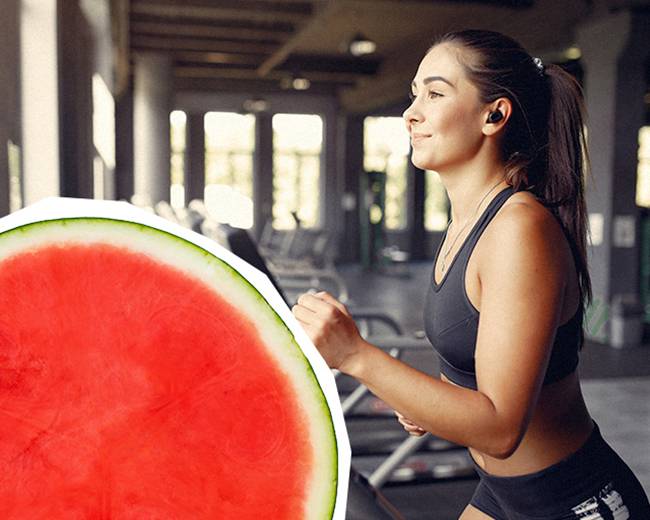Watermelon is one of the least fattening fruits and we tell you why. We will also answer your questions about the mythical question of whether watermelon is fattening at night.
Kiko Veneno used to say “everything I like is illegal or fattening”. Kiko, that’s because you don’t know Sandía Fashion. Watermelon is not fattening and we are going to tell you why.
In addition to its delicious taste, watermelon is high in water, nutrients and fibre, which makes it a perfect product to keep you at your ideal weight due to its low calorie content.
Watermelon is NOT fattening and here’s why
First, it is important to note that weight gain occurs when you consume more calories than you burn. In other words, if your calorie intake is greater than your energy needs, then you will accumulate fat and gain weight. That is why it is always important to incorporate physical exercise into your daily routine if you intend to lose weight. Get professional help so that they can guide you according to your physical shape and age, but remember that walking is always a good option and that taking the stairs to the office and forgetting about the lift is always a good idea.
Therefore, if we want to know whether watermelon is fattening, it is necessary to analyse its calorie content.
Watermelon is a low-calorie fruit, as it contains approximately 30 calories per 100 grams. This means that if you eat a portion of watermelon, around 300 grams, you will be consuming around 90 calories.
Compared to other fruits, such as bananas or apples, which contain around 100 calories per 100 grams, watermelon is a much lower calorie option.
In addition, watermelon is a water-rich fruit, which means it has a high fluid content and is very hydrating. This is especially important if you are trying to lose weight or maintain a healthy weight, as staying hydrated can help you feel fuller and reduce food cravings.
Another important aspect to consider is the glycaemic index of watermelon. The glycaemic index (GI) is a measure that indicates the rate at which foods raise blood sugar levels. Foods with a high GI can cause a spike in blood sugar, which can lead to food cravings and increased calorie intake.
Fortunately, watermelon has a low GI, which means that its consumption does not cause a significant increase in blood sugar levels. This makes watermelon a healthy choice for those who want to control their sugar intake and avoid food cravings.
Sandía Fashion is high in fibre so you’ll feel fuller and keep your appetite at bay for longer, avoiding those unhealthy snacks.
In addition, watermelon is rich in important nutrients such as vitamin C, which is an antioxidant that helps strengthen the immune system, and lycopene, a compound that has been linked to the prevention of cancer and heart disease. These nutrients are essential for maintaining good health and general well-being.
Having watermelon mid-morning or for a snack is a great choice as you won’t gain too many calories, it will hydrate and satiate you. And we’re not just talking about a slice of watermelon. Get creative with how you eat it and you’ll discover just how much fun watermelon recipes can be. If you’re not much of a cook, here’s a recipe booklet illustrated by Palito Dominguín for you to download for free and discover different ways to eat watermelon.
We answer the mythical question: Is watermelon fattening at night?
And what happens if we eat it at night? Well, let’s debunk the myth that watermelon is fattening at night.
Watermelon has no clock which means that it is not more fattening depending on the time of intake.
It is true that whatever we take before we go to sleep is not burned as much as during the day, but its low calorie content means that we process it more quickly.
However, it is important to remember that any food can be fattening if consumed in excess. Although watermelon is a healthy and nutritious fruit, it is important to consume it in moderation and in the context of a balanced and varied diet. It is not advisable to base your diet exclusively on watermelon, as your body needs a variety of nutrients and foods to function properly.
It is also important to note that the way you consume watermelon can affect its impact on your diet. For example, if you consume watermelon in juice or smoothie form, it may be less filling and may contain more added calories (such as sugar) than the whole fruit. Therefore, it is advisable to consume watermelon in its natural form and avoid preparations that add calories and sugars. If your aim is to lose weight, forget about adding cream or other ingredients that add calories to watermelon.
Also, if you have specific health problems, be sure to talk to a health professional to determine the right amount of watermelon for you.
Remember that watermelon is a healthy, low-calorie fruit that can be an excellent choice for those looking to lose weight or maintain a healthy weight. Its high water and nutrient content, combined with its low GI, makes it a refreshing and nutritious option.
Sandía Fashion is the best option for a balanced and varied diet.




